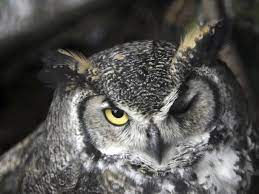
Is this owl winking? Awake or Asleep?
A few years back, the then youngest CEO of SAP India, Ranjan Das, a fitness freak, a marathon runner, came home from his usual workout at the gym, and collapsed of a massive heart attack.
How can someone who was athletic, at the pink of his health and in top form, die of heart attack? The reason? He didn’t sleep enough.
In today’s fast paced world where time is at short supply, the first activity we cut short on, is sleep. So let’s attempt to understand about sleep a little more: why we sleep, how much sleep is enough, what are the effects of lack of sleep and how to sleep better.
During the time we sleep, we don’t eat, we don’t work, we don’t play, we don’t have sex, we don’t seem to be doing anything worthwhile and hence at first glance, sleeping appears to be a complete waste of time. But we all sleep, every single day.
It is not just humans that sleep, all mammals and birds sleep too. Even small animals that are at risk of losing their lives to their predators while asleep, also sleep. Why do they need to sleep at such high risk to their lives? Normally evolution would have weeded out such species as part of natural selection. But it hasn’t happened, pointing to the importance sleep plays in every life form.
Dolphins, which are closer to human beings are not like other fish. They breathe air like us through the blowholes on top of their heads. Which means, they need to periodically surface from water to breathe. But how do they breathe when they sleep? Without any predator they might die simply because they slept when they had to breate!! But we know dophins don’t die in their sleep. How do they do it? To manage this, they sleep one half of the brain at a time called unihemispherical sleep. One hemisphere of their brain sleeps while the other stays alert. And then the cycle alternates. They sleep in pairs such that the alert part of their bodies (since each hemisphere of the brain controls one half of the body) are on the outside, to keep an eye on predators and synchronise their surfacing to breathe.

A few other mammals like bats, seals, some long distance migratory birds and owls also demonstrate unihemispherical sleep.
Why did nature go to such lengths to ensure we sleep?
That’s a question scientists have been trying to answer for several years now. Despite the years of scientific research on sleep, our understanding of sleep is very basic even today.
When asked why we sleep, Dr William Dement – called the Father of Sleep Medicine – who was also the Founder of Sleep Research Centre at Stanford says
“We don’t really know. We sleep in order to not be sleepy otherwise”
Dr. Clete Kushida, the Medical Director, Stanford Sleep Medicine Centre, after years of research since the 1970s also says he still doesn’t know.
But there are a dozen theories, let’s see the three most popular ones
- We sleep to conserve energy. Our brain is only 2% of our body weight but uses 20% of the energy. To provide this, our brain shuts down active bodily functions [it literally paralyses our muscles to keep us still] during sleep and uses the energy for itself.
- Body restores itself during sleep. Muscle growth, tissue repair, protein synthesis – all happen through an orchestra of hormones that create a symphony of events during our sleep. In simple terms, various toxins are flushed out and we grow during our sleep
- Brain processing and memory consolidation –the filing of events, making them available when needed and using them to handle similar situation – in short this is intelligence. So during sleep, brain does the housekeeping to keep us intelligent. Empirical evidence suggests that if you sleep well, you are three times more likely to be creative.
Okay, so what is the right duration of sleep. Is it 6 hrs, 7 hrs? 8?, 9? How much is good enough. There is no consensus, but adult humans need at least 6 hrs of sleep at a stretch. A good empirical measure is, if you don’t feel sleepy during the day until your next regular sleeping time, then that sleep duration is adequate for you.
Lack of sleep leads to mental, emotional & physical fatigue, depression, obesity and lower life expectancy.
On days following sleepless nights, high levels of cortisol accumulate in your body which leads to stress related disorders like cardiac ailments and diabetes. Sleep loss produces Grelin, which makes you seek carbohydrates and makes you obese. In short, chronic lack of sleep sets in motion a series of irreversible ailments that ruin our long-term health.
So how to get good sleep. If you have trouble getting good sleep, what can you do? Not much but a few things help.
- Keep a regular sleep schedule
- Exercise helps
- Limit Caffeine and alcohol, if unavoidable, don’t drink too close to sleeping time
- Turn off lights and keep the room as dark as possible.
- Keep mobiles away – even if you are only browsing it, the light from the mobile is troublesome.
Your life is a reflection of how you sleep , and how you sleep is a reflection of your life!. If you sleep well, you live better. So wake up to sleep facts my friends. Lack of sleep can kill!!!






Valuable information on the importance of sleep. I would like you to touch on overthinking topic which sometimes leads to a lack of sleep apart from physical health issues.
Hi Srikrishnan
Good one on importance of sleep. Please explain when the brain shuts down active bodily activites to conserve energy, why in the middle of deep sleep suddenly we are awake and the sleep gets disturbed and normal body functions start. (Just curious to know more about this phenomenon).
I was not aware of the sleep patterns of Dolphin. Thanks for sharing this information.